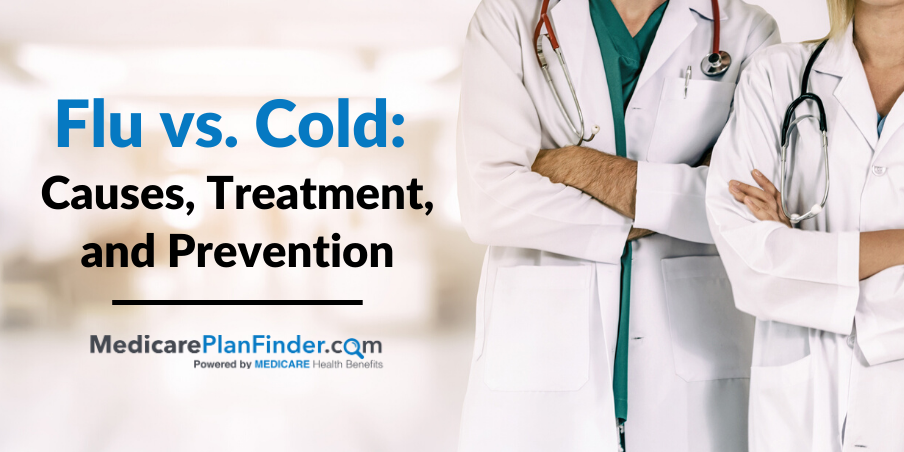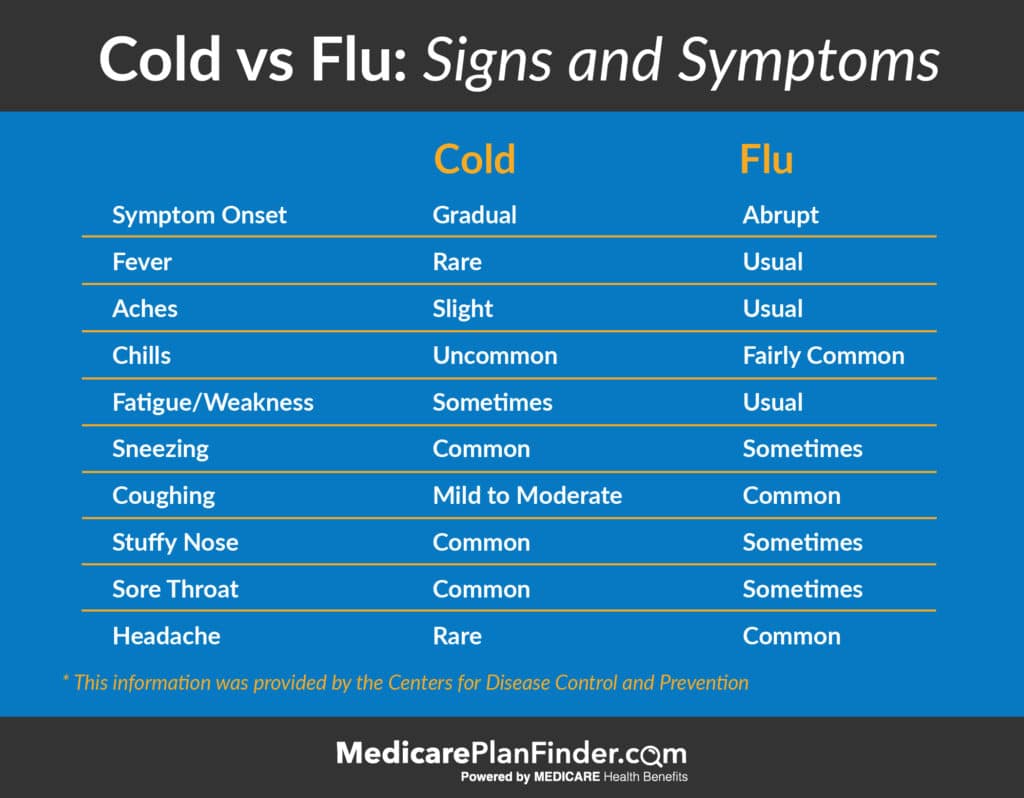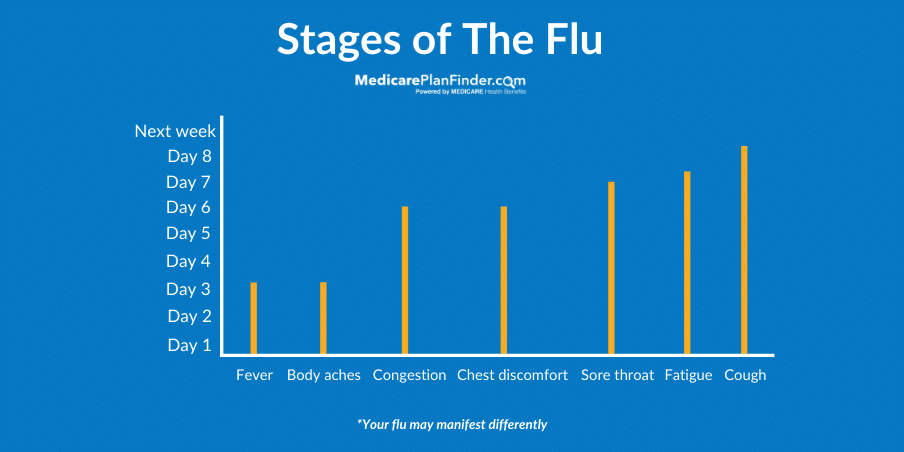
Flu vs. Cold: Guide to Causes, Symptoms, and Treatments for Older Adults
November 21, 2019The flu and the common cold are both upper respiratory infections that tend to pop up throughout the year (but especially in the colder months). Respiratory illnesses are infections of the body’s respiratory system, which includes the nose, sinuses, mouth, throat, voicebox, windpipe, and lungs. The cold and flu affect the upper respiratory system (nose, sinuses, and throat).
Since these illnesses can be common, it’s easy to ignore the symptoms and to avoid taking preventative measures. It’s also easy to not know whether you have a cold or flu! However, both can have some serious ramifications if not taken seriously! What have you done to protect yourself from the flu and the common cold?
How to Tell the Difference Between Cold and Flu
Colds can share symptoms with the flu, making it hard to tell which one you have. It’s important to find out early on whether you have the flu or a cold, because the treatment path may be different. Additionally, the flu can lead to more complications, so it’s better to know as soon as possible if there are other symptoms you need to watch for.
The CDC says that you should see a doctor to be tested for the flu within your first few days of experiencing symptoms. However, there are a few symptom differences you can look for on your own to start with. Mainly, if you have a fever or are experiencing chills, you should definitely see the doctor and find out if you have the flu. Both colds and the flu often come with headaches, fatigue, nasal congestion (runny or stuffy nose), and sometimes body aches or feverish symptoms.
The flu tends to be much more abrupt than a cold; you might feel great one day and awful the next. Most people will also have a fever and chills that last for multiple days with the flu, while a fever is more rare with a cold.
Colds tend to be much milder, so there’s a good chance that once you’ve had a few, you’ll know whether you have the flu or a cold. It’s still always a good idea to check with your doctor if you aren’t sure.

Common Cold Symptoms
The common cold can manifest slightly differently in each person. However, common symptoms of a cold are:
- Runny nose
- Stuffy nose
- Sneezing
- Nasal congestion
- Cough
- Sore throat
- Mild headaches and body aches
- Fatigue
- Low-grade fever
You should see a doctor if you aren’t sure whether you have a cold or the flu, but you should definitely see a doctor (visit an urgent care facility if necessary) if you experience shortness of breath, wheezing, severe pain, a fever that lasts more than one day, or any fever that reaches over 101.3 degrees.
Common Cold Virus Name & Causes
The common cold virus is most often caused by either coronaviruses or rhinoviruses. It is uncommon, but possible, for these viruses to cause further damage, such as pneumonia and bronchitis. Further damage is more common with the flu than with the common cold, and is more common in people who already have immune disorders or are affected by other conditions.
Coronaviruses and rhinoviruses can spread through the air when someone who has a virus coughs, sneezes, or even talks. The viruses can enter your body through your mouth, eyes, or nose.
Common Cold Prevention
Since the cold virus spreads through air particles, it can be anywhere. It’s best to always avoid touching your mouth, eyes, or nose without thoroughly washing your hands first. You should also avoid sharing bath towels, food, drinks, and even everyday objects like computer keyboards with someone who is sick.
Sometimes, you may not know that people are sick. That’s why it’s also best to always be cautious in public areas. For example, airports and planes carry a lot of germs, which may be why you find yourself getting sick whenever you travel for the holidays. Believe it or not, USA Today reported that security bins are the most germ-ridden objects in airports. Think about it – is anybody cleaning those trays? Probably not, or at least not very often, yet thousands of travelers touch them and put their objects in them every day.
Always wash your hands after touching public objects, and avoid touching them when you can! Carry hand sanitizer with you for moments when you can’t get to a sink.
You can help keep the cold virus from spreading through your home, office, and any other public area by:
- Staying home when you’re sick, if possible
- Avoiding hugs, kisses, and handshakes
- Coughing into your arm, not your hands
- Sneezing into a tissue
- Washing your hands immediately after blowing your nose
- Using cleaning products to disinfect surfaces

Can the Cold Virus be Transmitted Through Food?
The cold virus can absolutely be transmitted through food. Whether you’re sharing a disk with someone or coughing over the food you’re serving, your germs can live on your food. In fact, one hospital reported that cold viruses could remain on a surface for as long as seven days.
Head Cold vs. Cold
Some people use the terms “head cold” and “common cold” interchangeably. Realistically, a head cold is a form of the common cold. You could either have a head cold or a chest cold, it just depends on the location of your symptoms. A head cold probably means that you have either a stuffy or runny nose and some congestion along with a fever or a headache. If you have a chest cold, you’re more likely to feel that in your throat, and you might even experience some chest discomfort or wheezing.
Common Cold vs. Sinus Infection
It may be hard to tell whether you have a cold or a sinus infection because the symptoms are generally the same. The only difference is what caused the illness in the first place. While the common cold is a viral infection, a sinus infection is a bacterial infection. You can cure a sinus infection with antibiotics, but antibiotics won’t do much for you if what you have is the common cold. Antibiotics cannot treat a viral infection.
Common Cold Treatment
There is currently no known cure for the common cold because it is a viral infection and not a bacterial one. You should always see a doctor if your symptoms don’t improve or if you don’t know how to treat your illness. Healthline recommends the following treatment plan for the common cold:
- Get lots of rest and sleep
- Drink plenty of fluids, especially water and natural fruit juices
- Certain teas can also be great for a cold
- Avoid caffeine and alcohol
- Eat soup or soup broth
- Use lozenges or cough drops to cure a sore throat
- Use a decongestant or saline spray to loosen up your nasal passages
- Sleep with a humidifier to ease congestion
- Use over-the-counter pain relievers like ibuprofen for headaches and fevers

Common Cold Treatment at Home
As long as you are sure that you have a cold and not the flu or a sinus infection, you can treat your cold symptoms at home. Using the suggestions provided by Healthline above and avoiding too much energy exertion may be all you need.
Be sure to stay hydrated and eat healthy foods while you’re recovering (and all the time). If it’s possible to stay home, let yourself relax for a few days.
Common Cold Medicine
Since the common cold is a viral infection, it cannot be treated with antibiotics. However, there are several different medications on the market that can be purchased over-the-counter and can help cure your symptoms.
There may be a better option on your pharmacy shelf, but after researching common cold medicines, we found the following options:
- Vicks DayQuil and NyQuil: Relieves headache, fever, sore throat, minor aches and pains, nasal congestion, and cough. The “DayQuil” product is non-drowsy, while the “NyQuil” product may help you sleep at night. Generic versions of these products may be available at your pharmacy.
- Mucinex Sinus-Max: Relieves headache, fever, cough, and nasal congestion. Mucinex has a variety of products that you may find in your pharmacy that offer different types of cold symptom relief. Read each box before you make a decision, or ask your pharmacist for help.
- Robitussin: Controls and relieves cough and chest congestion and thins and loosens mucus. Has a non-drowsy effect.
- Tylenol Cold + Head: Controls and relieves headache, body aches, fever, sore throat, nasal congestion, chest congestion, and mucus. Tylenol also has a series of products that you may want to look at before making a decision.
Did you know that some Medicare Advantage plans include an over-the-counter pharmacy benefit? Click here to get in touch with a licensed agent.

Ibuprofen for Cold
Some people swear by using ibuprofen products (such as Advil) for treating cold symptoms like headaches and fevers. However, one British study found that ibuprofen is ineffective for sinus pain. You may want to try ibuprofen when you have a cold, but if it doesn’t work and you want to try something else, be sure to wait the appropriate amount of time labeled on the box before putting another medication in your body.
Common Cold Menthol
Menthol is a cooling ingredient found in plants like mint (it even has a mint-like smell). Menthol is used in Vicks VapoRub and in certain cough drops. Menthol can ease breathing and reduce coughs and throat pain.
How to get rid of a Cold in 24 Hours with Quick Common Cold Remedies
Depending on the severity of your cold, you may not be able to completely get rid of it in 24 hours. However, there are certain steps you can take to speed up your recovery time. The more time you spend sleeping and relaxing, the quicker you are likely to recover.
You should also be sure to eat healthy meals like soups and salads, even if you don’t feel hungry. Only drink water, tea, and all-natural juices that are high in antioxidants, like orange juice and cranberry juice.

Flu Causes, Symptoms, and Treatment
Influenza, most commonly referred to as “the flu,” can be catastrophic when not handled properly. The flu is different from a cold and is often more severe and abrupt. For instance, most people who have influenza experience a fever. Other symptoms include:
- Fever/feverish chills
- Cough and sore throat
- Runny or stuffy nose
- Muscle aches
- Headaches
- Fatigue
- Vomiting
- Diarrhea
Even if you do not experience all of those symptoms, it does not mean you don’t have the flu. It’s always a good idea to see your doctor if you aren’t sure.
Flu symptoms in elderly people are generally the same as those in the younger population, but they may be more severe.
Your doctor may or may not perform an official flu test to diagnose you, because whether or not you have the flu may not change your treatment plan. Since the flu (like the common cold) is a viral infection, it cannot be treated with antibiotics.
However, unlike the common cold, the flu can lead to life-threatening illnesses and complications such as pneumonia, sinus infections, ear infections, heart inflammation, muscle inflammation, brain inflammation, and even organ failure. People who have other preexisting conditions such as asthma or heart disease are at a much higher risk of complications.
If you experience any of these more severe symptoms, it is crucial that you get to an urgent care facility or emergency room right away:
- Difficulty breathing
- Severe chest or abdomen pain
- Dizziness or confusion
- Seizures
- Inability to urinate
- Severe muscle or body pain
- Severe weakness
- High fever
- Severe dehydration
- Other worsening of chronic conditions
There are technically three different types of the flu virus. Types A and B are what cause the annual influenza outbreak that your doctors want you to get vaccinated for. Type C is generally much less severe. Additionally, type A can affect animals as well as humans (though it is highly unlikely that you and your pets will trade the virus back and forth).
Stages of the Flu
A typical case of influenza will appear as follows:
- Days 1-3: Headache, muscle pain, fatigue, cough, sore throat, fever, stuffy nose
- Day 4: Fever and muscle aches disappear or decrease, while chest discomfort may increase. Fatigue and congestion may continue.
- Day 8: Symptoms overall decline, but fatigue and cough may continue for 1-2 weeks.

When to See a Doctor for the Flu
Without knowing your state of health, we cannot say whether or not you should see a doctor. Some people say that healthy adults really don’t have to see a doctor for the flu at all. However, the earlier you are able to test to find out if you have the flu or a cold, the sooner you can start the appropriate treatment. Plus, if you do have the flu, you can’t get an antiviral prescription without seeing your doctor – and antiviral medications are only effective if you take them within 48 hours of experiencing symptoms.
Flu Treatment for Adults
Similar to the common cold, there is no known cure for the flu. The best way to treat the flu is to treat the symptoms.
Treating flu symptoms in elderly people is not much different than in younger adults or even kids (though kids may need more rest).
The CDC recommends that you stay home for at least 24 hours after your fever is gone (except to seek medical care). You should stay away from others, wash your hands often, cover coughs and sneezes, and even consider wearing a face mask to avoid infecting others.
You should care for yourself by:
- Getting plenty of bed rest
- Drinking lots of fluids, especially water, tea, and natural fruit juice
- Eating only healthy foods and soup/broth
- Using cough drops to soothe a sore throat or cough
- Using a humidifier and nasal sprays to open your passages
- Using over-the-counter cold medicines to reduce pain and discomfort

Prescription Flu Medicine
Unlike treatment for the common cold, a doctor may prescribe an antiviral medication for flu treatment. These drugs work best when you begin treatment early. They can shorten your illness by about a day and can lessen your symptoms, also reducing the chance of further complications.
Tamiflu
Your doctor might prescribe the antiviral medication called Tamiflu for influenza treatment. Tamiflu is available in both liquid and capsule form and is FDA-approved for all ages (two weeks and older).
Make sure to pay attention to your doctor’s instructions when taking Tamiflu.
Tamiflu is most effective when taken within 48 hours of experiencing flu symptoms. You should take it with food according to your doctor’s instructions. The Tamiflu website suggests that anyone over the age of 13 should take 75mg twice daily for five days. Those under the age of 13 should take one dose based on weight twice daily for five days.
Technically, the Tamiflu website advertises that you can take Tamiflu even without experiencing influenza symptoms if you know you’ve been exposed to the flu (for up to six weeks). That might be a good option for couples living together or parents taking care of a child with the flu virus. In this case, you should only take one dose once daily as long as prescribed.
If you are taking any other medications, be sure to disclose that information to your doctor to make sure there won’t be any negative interactions.
Additionally, make sure that if you do have to take liquid Tamiflu for more than days, it should be stored in the refrigerator. All forms of Tamiflu (liquid or capsule form) should be discarded once you stop needing it.
Flu Medicine OTC
Antiviral medications cannot be purchased over-the-counter, but some OTC cold medicines can treat your flu symptoms the same way that they treat cold symptoms. Look for OTC medications labeled “cold & flu” at your local pharmacy, and ask the pharmacist for help.

How Long Does the Flu Last in the Elderly?
The flu virus typically hangs around for about a week, but symptoms can remain for as long as two weeks. People ages 65 and older are more likely to experience complications from the flu than younger adults.
How to Cure Flu Fast
The fastest way to cure the flu is to take care of yourself and take your doctor’s advice. If your doctor prescribes an antiviral medication, be sure to take it as directed. Regardless, be sure to get plenty of sleep and drink extra water to help cure the flu as quickly as possible.
Getting Your Flu Shot
Since people over the age of 65 are more likely to suffer complications from the flu virus, it is very important that you get your flu shot every year.
Flu Shot Dangers in Elderly People
The flu shot has been known to cause some minor side effects such as pain, swelling, or soreness at the injection site, as well as muscle aches and headaches. However, the side effects typically only last for one or two days and are much better than contracting the flu and any resounding complications. Additionally, some people may be allergic to the flu shot. Those who are allergic should speak to their doctor about alternatives and ways to prevent infection.
Does Medicare Cover Flu Shots?
Even if your health insurance doesn’t cover your flu shot, many clinics and pharmacies offer free flu shots or give incentives like $5 gift cards when you get your flu shot.
Regardless, if you have Medicare, Medicare Part B will cover your flu shot as a preventative service.
Original Medicare may be all you need to treat the flu, but a Medicare Supplement plan can help you cover your copayments, and a Medicare Advantage plan can add additional benefits such as non-emergency medical transportation to get you to the doctor and over-the-counter drug coverage to fund your cold medicine.
To speak to a licensed agent about adding Medicare coverage, call 844-431-1832, or start searching for plans.


